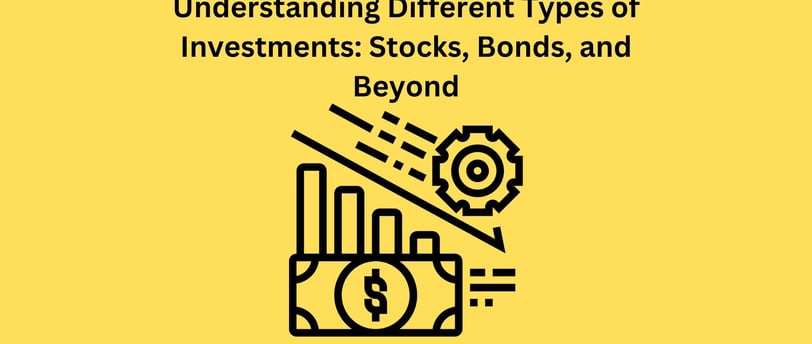Understanding Different Types of Investments: Stocks, Bonds, and Beyond
Investing Insights
INVESTING
Awah Aweh
3/4/20254 min read


Investing can seem confusing. But it doesn't have to be. Understanding different types of investments is key to growing your money. In this article, we will explore stocks, bonds, and other investment options. By the end, you will have a clearer idea of how to invest.
What are Investments?
First, let’s define what an investment is. An investment is something you buy with the hope that it will make you more money in the future. This could be cash, property, or even a business. The goal is to see your money grow over time.
Types of Investments.
1. Stocks.
One of the most popular types of investments is stocks. When you buy a stock, you buy a small piece of a company. If the company does well, the value of your stock goes up. You can then sell it for a profit.
Here are some key points about stocks:
1. Ownership: Buying a stock means you own a part of the company.
2. Dividends: Some companies pay dividends. This is a portion of their profits paid to shareholders.
3. Risk: Stocks can be risky. The value can go up and down a lot.
4. Long-term Growth: Many people invest in stocks for long-term growth.
Investing in stocks can be exciting. You might hear stories of people making a lot of money. But remember, it’s essential to do your research. Not all companies will succeed.
2. Bonds.
Another common investment is bonds. When you buy a bond, you are lending money to a company or the government. In return, they promise to pay you back later, plus interest.
Here are some key points about bonds:
1. Fixed Income: Bonds usually pay a fixed amount of interest regularly. This makes them more stable than stocks.
2. Less Risk: Bonds are generally considered safer than stocks. They don’t have the same ups and downs.
3. Maturity: Every bond has a maturity date. This is when you get your money back.
4. Types of Bonds: There are different types of bonds, including government bonds and corporate bonds.
Bonds can be a good choice if you want steady income and less risk. They can balance out your investment portfolio.
Mutual Funds.
Mutual funds are another way to invest. A mutual fund pools money from many investors. A professional manager then invests this money in different stocks, bonds, or other assets.
Here are some key points about mutual funds:
1. Diversification: By investing in a mutual fund, you can own a variety of stocks and bonds. This reduces risk.
2. Professional Management: You don’t have to manage the investments yourself. A professional does it for you.
3. Fees: Keep in mind that mutual funds often charge fees. This can eat into your profits.
4. Accessibility: Many mutual funds have a lower minimum investment than buying individual stocks or bonds.
Mutual funds can be a good choice for beginner investors. They offer a way to diversify your investments without a lot of effort.
Exchange-Traded Funds (ETFs).
ETFs are similar to mutual funds, but they trade like stocks on an exchange. When you buy an ETF, you buy shares of the fund. This gives you exposure to many assets at once.
Here are some key points about ETFs:
1. Flexibility: You can buy and sell ETFs anytime during market hours.
2. Low Fees: ETFs often have lower fees than mutual funds.
3. Variety: There are many types of ETFs. Some track stock indexes, while others focus on specific sectors.
4. Tax Efficiency: ETFs can be more tax-efficient than mutual funds.
ETFs are a great option if you want the benefits of mutual funds with the flexibility of stocks.
Real Estate.
Investing in real estate is another option. This means buying property to earn money. You can earn money in two ways: rental income and property appreciation.
Here are some key points about real estate:
1. Rental Income: You can rent out property and earn a steady income.
2. Appreciation: Over time, property values may increase, allowing you to sell for a profit.
3. Management: Owning property requires management. You may need to deal with tenants or maintenance.
4. Illiquidity: Real estate is not as easy to sell as stocks or bonds. This means you may have your money tied up for longer.
Real estate can be a rewarding investment, but it requires more effort and knowledge.
Cryptocurrency.
In recent years, cryptocurrency has gained popularity. Cryptocurrencies, like Bitcoin and Ethereum, are digital currencies that use blockchain technology.
Here are some key points about cryptocurrency:
1. High Volatility: Cryptocurrency prices can change quickly. This means the potential for high returns but also high risk.
2. Decentralized: Cryptocurrencies are not controlled by any government or bank.
3. Innovation: The technology behind cryptocurrencies is still developing. This makes it an exciting, but risky, investment.
4. Research: It’s essential to research before investing in cryptocurrency. The market can be unpredictable.
Cryptocurrency can be an interesting addition to your investment portfolio, but it should be approached with caution.
Conclusion
Understanding different types of investments is crucial for anyone looking to grow their money. Stocks, bonds, mutual funds, ETFs, real estate, and cryptocurrency all offer unique benefits and risks.
By learning about these options, you can make informed decisions. Start small, do your research, and don’t rush. Investing is a journey. Take your time to understand what works best for you. Remember, the more you know about different types of investments, the better prepared you will be for your financial future.

